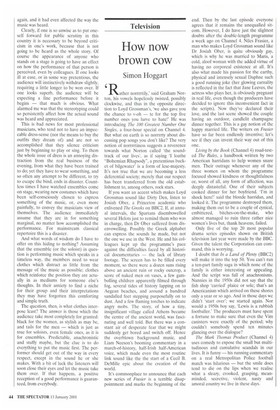Television
How now brown cow
Simon Hoggart
Rather norrrrtily,' said Graham Norton, his vowels hopelessly twisted, possibly clockwise, and thus in the opposite direction to Loyd Grossman's, 'we also gave you the chance to v-oh — te for the top five number ones you lurve to hate!' He was introducing The 100 Greatest Number One Singles, a four-hour special on Channel 4. But what on earth is so norrrrty about discussing pop songs you don't like? The very notion of norrrrtiness suggests a reverence towards what Norton called 'the soundtrack of our lives', as if saying 'I loathe "Bohemian Rhapsody", a pretentious bucket of bilgewater' is a form of lese-majesty. It's not true that we are becoming a less deferential society; merely that our respect has been transferred from the old establishment to, among others, rock stars.
If you want an accent which makes Loyd Grossman sound like Dirty Den, listen to Josiah Ober, a Princeton academic who enlivened The Greeks on BBC2. If, at annual intervals, the Spartans disembowelled several Helots just to remind them who was in charge, then Dr Ober suffered from disenvowelling. Possibly the Greek alphabet can express the sounds he made, but not the one we use in the West. He and his colleagues kept up the programme's pace against the difficulties faced by all historical documentaries — the lack of library footage. The screen has to be filled every moment, so there were a dozen suns rising above an ancient ruin or rocky outcrop, a score of naked men on vases, a few gambolling children apparently filmed through fog, several tides of history lapping on to Aegean beaches, and around a hundred sandalled feet stepping purposefully on to dust. And a few flaming torches to indicate angry mobs. The story, of how a tiny, insignificant village called Athens became the centre of the ancient world, was fascinating and well told. But there was a constant air of desperate fear that we might suddenly get bored and switch off. Hence the overblown background music, and Liam Neeson's booming commentary in a march-of-history, half-Irish half-American voice, which made even the most routine link sound like the the start of a Cecil B. DeMille epic about the creation of the world.
It's commonplace to announce that each new series of Frasier is a terrible disappointment and marks the beginning of the end. Then by the last episode everyone agrees that it remains the unequalled sitcom. However, I do have just the slightest doubts after the double-length programme a week ago on Channel 4. Niles Frasier, a man who makes Loyd Grossman sound like Dr Josiah Ober, is quite obviously gay, which is why he was married to Mans, a cold, aloof woman with the added virtue of having no corporeal existence at all. It's also what made his passion for the earthy, physical and intensely sexual Daphne such a good running joke (her glowing carnality is reflected in the fact that Jane Leeves, the actress who plays her, is obviously pregnant in real life, even though the producers have decided to ignore this inconvenient fact in the scripts). Now they've declared their love, and the last scene showed the couple having an outdoor, candlelit champagne dinner together. This is a gay notion of the happy married life. The writers on Frasier have so far been endlessly inventive; let's see if they can invent their way out of this one.
Living by the Book (Channel 4) road-tested The Rules, a handbook written by two American harridans to help women snare men. Their outrage whenever any of the three women on whom the programme focused showed kindness or thoughtfulness or, worst of all, any form of affection, was deeply distasteful. One of their subjects cooked dinner for her boyfriend. 'I'm in shock here!' said the blonde harridan, and looked it. The programme destroyed them, making them out to be a couple of cynical, embittered, bitches-on-the-make, who almost managed to ruin three rather nice women's lives but, thank heavens, failed.
Only five of the top 20 most popular drama series episodes shown on British television last year were made by the BBC. Given the talent the Corporation can command, this is worrying.
I doubt that In a Land of Plenty (BBC2) will make it into the top 50. You can't run a ten-part family saga in which none of the family is either interesting or appealing. And the script was full of anachronisms. Nannies in the 1950s did not say that the fish shop 'carried' plaice or sole; that's an Americanism which arrived on these shores only a year or so ago. And in those days we didn't 'start over'; we started again. Nor would a 1950s boy say, 'Lewis is a rubbish footballer.' The producers must have spent a fortune to make sure that even the Vim canisters were exactly of the period; why couldn't somebody spend ten minutes glancing over the dialogue?
The Mark Thomas Product (Channel 4) uses comedy to expose the small but multitudinous and cumulative scandals in our lives. It is funny — his running commentary on a real Metropolitan Police football match was hilarious — but the smile does tend to die on the lips when we realise what a sleazy, crooked, grasping, meanminded, secretive, violent, nasty and amoral country we live in these days.






























































 Previous page
Previous page